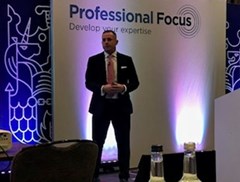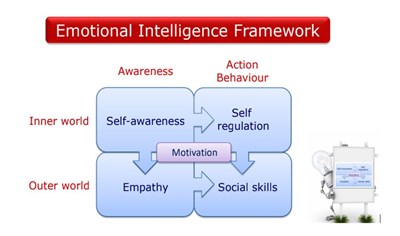Wed 29 May 2019
CII Professional Focus 2019

Many of the sessions were interactive and at one session, light bulbs (rubber – please we are insurers after all!) were thrown at participants. These were not to wake people up, but to thank delegates for their good feedback. If you see someone with a rubber light bulb on their desk you know that they can think of a bright idea and have been rewarded for doing so.
Lee Travis – Partnership and Member, Engagement Director of the CII opened the event and acted as the host. He explained that the CII are trying to engage more on a face to face basis, with more local involvement. A three to five-year change programme has started the process of moving away from a one size fits all approach. The new CII mantra is “never stop learning”. With this in mind, a summary has been prepared, for the website for those that did not attend. There is also a link that can be used to access the slides. Please click here.
1. Risk of Cyber Attacks – Eva Berg-Winters of Bewica
The first session, gave an understanding the Risk of Cyber Attacks and was very concerning. Eva Berg-Winters from Hazell Bewica said that 32% of UK businesses have experienced a cyber-attack in 2018 and more than £5 billion has been lost to cybercrime by small businesses. Attacks may be fewer in number but are more sophisticated. Phishing has morphed into three types – ordinary phishing, spear phishing – targeted on smaller groups or whaling – going after the top people.
Ninety percent of us have received an email that is vulnerable to phishing and institutions such as HMRC have put in place DMARK and Cross site scripting to inject more security. Eva gave examples of hacking and gave some very pragmatic and helpful ways of dealing with a hack.
Eva then gave a list of what we, as individuals should do: -
• Check emails and passwords.
• Keep up to date with software updates.
• Don’t use public Wi-Fi when dealing with sensitive data.
• Be vigilant when moving payments.
• She concluded with enjoy the internet but be vigilant – it’s a balance!
2. Evolution of Terrorism: - Steve Coates of Pool Re
Steve explained how Pool Re started 26 years ago as a temporary solution until there was a recovery in the market, however, since then it has become an Insurance institution owned by the Insurance industry, with an unlimited guarantee from the Treasury. Pool Re is unlike any other Reinsurance company - Understanding and underwriting the risk of Terrorism. Steve considered the definition of Terrorism from the 1993 Reinsurance Act which is:-
‘Acts of persons acting on behalf of or in connection with any organisation which carries
out activities directed towards the overthrowing or influencing, by force or violence, of Her
Majesty’s government in the UK or any other government de jure or de facto’
Pool Re does not cover the Channel Islands or the IOM and Northern Ireland has a separate framework in place
Steve gave details of threats and attacks, both internationally and domestic and details of groups who are opening in the UK that could affect security.
From the 12th February 2019, Pool Re now covers losses incurred if a business cannot trade or is prevented from accessing their premises following a terrorist attack without the requirement for there to be damage. Prior to the change, Pool Re could only cover losses incurred if there was physical damage to the premises caused by terrorism.
3. Negotiation for Insurance Professionals – Melissa Kidd of Motem Ltd
Melissa gave a very interactive talk on how to negotiate successfully. Her interest in negotiation started when she was held at gunpoint for money at a border crossing. Her skills and a pair of plastic sunglasses enabled her to leave the country with a very small payment.
She explained the most common mistakes for failing when negotiating are:-
• Lack of preparation.
• Lack of confidence.
• Not holding your own ground.
• Not building a relationship first.
• Talking too much.
• Treating a negotiation as it if were the same – negotiators do not always have your values.
It’s important to always stand in the shoes of others and consider what can you give away, what are your priorities, break points and openers. Always make yourself likeable and ask questions.
Melissa gave some tips if the negotiation stalls. Don’t rollover but say:-
• I am sorry that’s not going to work for us.
• If you can’t do X what can you do?
• How can we find ourselves a way forward?
• Is that your best price?
• If you can move on this, I can move on that.
• It sounds that you want to think about this should I come back to you via email.
When talking too much, Melissa said take a deep breath, take control and ask questions.
Finally, she talked about other negotiators not having the same values as you. It is crucial to prepare, and always remember Chester Karrass’s quote –“You don’t get what you deserve, you get what you negotiate.”
4. Blockchain and Insurance Theory and Practice – Gary Nuttall of Distylics
Gary gave a thoroughly enlightening talk on what Blockchain and Cryptocurrency are and how they are being used. He explained how Blockchain is used as the protocol for a “Distributed Ledger”. The “Distributed Ledger” is a universal database for everyone and everybody. No more reconciliations of transferring records from one bank to another, you would just have one Ledger. This technology is still innovative but being used by some of the biggest companies.
Blockchain allows you to transfer currency without the need for a third party (such as a bank or Paypal).
Gary also explained what Bitcoin is and how it works, explaining that it is an electronic cash system that is fully peer to peer.
• HTTP is the protocol for the World Wide Web – Displays information.
• TCP/IP is the protocol for the Internet – Data shares.
• Blockchain is the protocol for the Distributed Ledger – Transfer of value.
Cryptography makes Blockchain secure by adding an extra layer to the ledger – it wraps around the whole thing.
Gary also explained what a Smart Contract was - a computer programme of business logic with data sources.
He also explained the cryptographic hash function which is a hash function that takes an input (or 'message') and returns a fixed-size string of bytes. The string is called the 'hash value', 'message digest', 'digital fingerprint', 'digest' or 'checksum'. ... It is extremely easy to calculate a hash for any given data.
5. Talking to the Skies – Jason Smith CEO of CineCloud
Jason gave delegates a very entertaining and informative talk with videos and real-life examples from very large and some very small drones.
Jason gave an overview of the regulations in place when flying a drone, which are governed by the Civil Aviation Authority (CAA). Drones can be flown for personal use as long as the user follows the rules set out by the CAA, however if a drone is to be used for commercial purposes a licence is required.
Jason explained how drones can be used by businesses, surveyors and by the insurance industry such as being able to obtain aerial footage of a premises following a loss, using the recent fire at the Notre dame cathedral as an example.
He explained the Drone Code and left delegates with the question – who did actually see a drone at Gatwick?
6. Telematics - The Connected Car and World Peace – Graham Gordon of Lexis Nexis Risk Solutions
Graham gave some extremely thought provoking statitics on how that little black box in a car has evolved to the extent that accidents have reduced dramatically over all age groups. Knowing that your breakage, speed, fuel consumption is being monitored and checked enables behaviour that helps cars performance and reduces accidents. Graham’s passion for telematics was triggered by four friends that all died in separate accidents, all before they were twenty years of age. It is his belief that if the technology available now was available then, there may have been very different outcomes.
7. The Natural Catastrophe Cycle – Kartik Lotlikar of AIG
Kartik talked to delegates about the top ten catastrophies and how they were all - bar one, natural, he talked about how statistics and looking at phenomenon enables insurers to measure risk. He talked about the threat of global warming and how this could increase catastrophies/disasters of the future. His talk on natural disasters was thought provoking and worrying.
8. An Introduction to Emotional Intelligence - Robin Hills of ei4change
The final talk of the day was on Emotional Intelligence. What you need to focus on as an insurance professional with the increasing threats of AI. He spoke about the rational brain/the emotional brain and the reptilian brain, the forebrain and right and left brain.
Lightbulbs were thrown to delegates who gave good answers. Robin referred to Daniel Goldman whose book sparked a revolution of thinking intelligently, by clever use of emotions. Robin said there is intelligence in emotions and intelligence can be brought to emotions and you see the world through how you feel.
The founder of the use of Emotional Intelligence was Aristotle with his famous quote: -
“Anybody can become angry - that is easy, but to be angry with the right person and to the right degree and at the right time and for the right purpose, and in the right way - that is not within everybody's power and is not easy.”
Robin finished by saying using your own Emotional Intelligence is a great advantage at work.
• It improves the ability to understand the needs of yourself and others.
• Helps manage yourself and others.
• Manage your own feelings.
• Enables you to respond to others in appropriate ways.
Delegates came away far more knowledgeable than when they started their intensive training day.
Thank you, CII, for a thoroughly enjoyable and very informative day!

